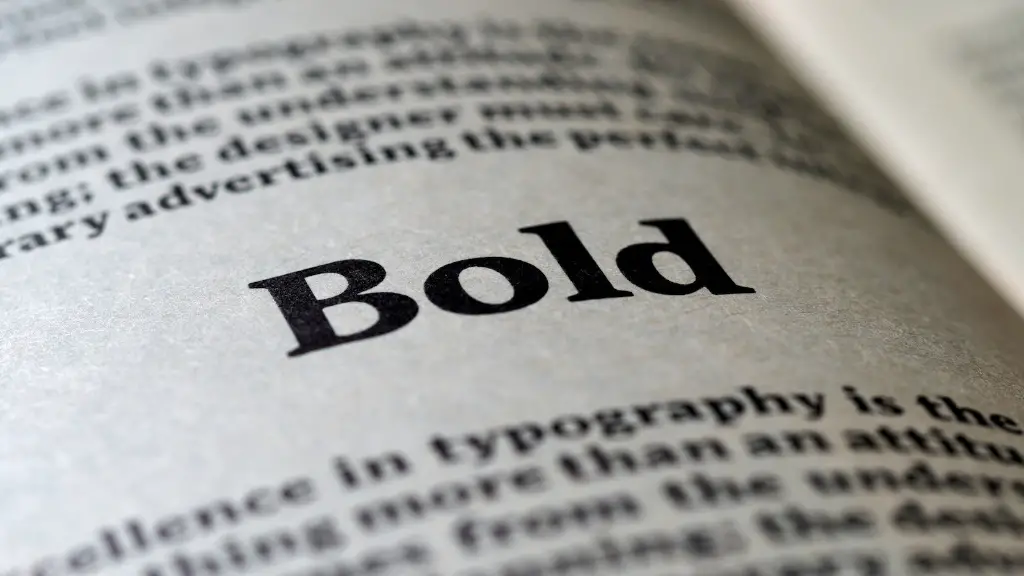Writing a book of poetry is an exercise in creativity, self-expression and attention to detail. It can also be a great way to make money, potentially publishing a bestseller, or to simply share your work with more than just family and friends. Self-publishing is, unfortunately, often accompanied by high cost and complex processes, but with dedication and careful planning, you can easily publish your book of poetry yourself.
To begin the journey of self-publishing a book of poetry, it is essential to organize your work. Analyze the type of poetry you have written, revise and refine your poems, and consider adding an introduction to the book. If you want to take it a step further, it can be helpful to include a dedication page and an author biography. There are many helpful resources that can provide pointers in order to ensure an aesthetically pleasing, quality production of your work.
After you have your poetry organized and edited, it is time to start the actual publishing process. This begins with deciding which size and style of book you would like to use. There are various types of bindings, paper qualities and trim sizes that you can choose from, ranging from mass-market paperbacks to library quality hardbacks. Furthermore, you have to decide if you want to print yourself or to use a printing company. This decision should be based on the quantity of the books you plan to print.
Once you have made the above decisions, you should create a budget for your project. This should include everything from copyright registration to printing and delivery costs as well as marketing if necessary. Once you have everything ready and accounted for, you should begin the registration process. Researching the library of congress is a necessary step in registering your book and securing the copyright protection.
While it is possible to register your book on your own, it may be more cost-effective to use a self-publishing service such as Kindle Direct Publishing, IngramSpark, or Lulu. These services provide help in the design and formatting process, as well as the printing, distribution and marketing of your book. These services can be costly, but are often worth the money.
Once the production of your book is completed, you have to decide how to market it. Creating a website, blog and social media accounts dedicated to your book is a great way to promote your work to a larger audience. It also helps to write press releases, reach out to book reviewers or book bloggers, or get in touch with bookstores. Even if you do not make a profit from your book, the exposure it will receive can be invaluable.
Keys to success
Self-publishing your own book of poetry requires dedication, organization and careful planning. The most successful authors are typically those who diligently research the processes, costs and potential marketing outlets prior to beginning the publication process. Additionally, many successful self-published authors make full use of the internet to advertise and market their books.
Benefits of Self-Publishing
One of the main benefits of self-publishing is having full control over the outcome of your book. You have the freedom to select the type of binding, paper quality and trim size for your book. In addition, self-publishing gives you the freedom to decide when, where and how to distribute your book. It allows you to build a reputation as an author, while collecting the full royalties from sales of your work. Furthermore, since there are no deadlines to meet when it comes to publishing, you can take as much time as necessary to perfect the project before releasing it to the public.
Knowledge is Power
Though self-publishing a book of poetry may seem daunting at first, the task is achievable with dedication and knowledge. It is important to learn about the self-publishing process, to become familiar with the various services offered and to know about copyrights and the registration process. With careful planning and well-thought out decisions you can turn your project into a success.
Changing Landscape
Though self-publishing has been around for a long time, the industry is ever-changing and evolving. With advances in technology, there are now even more tools available to help authors self-publish effectively. For example, products such as HelpVine and Kindle Create offer authors access to resources and tips to help ensure that their projects are successful.
The Pros and Cons
Self-publishing a book of poetry has many potential benefits, such as full control over the outcome of the book, greater financial earnings and a better reach of potential readers. However, it also has its drawbacks. These include the costs involved in self-publishing, the extensive research and learning that is needed, and the fact that many self-published books are not taken as seriously as traditionally published books.
Making It Work
For the self-publishing author, success is often achieved through creative, diligent marketing strategies. This includes the use of digital tools and platforms, as well as traditional methods such as appearances and book signings. Furthermore, the author should always be respectful of the time, money and energy invested in the project, as well as be willing to take risks and try new ideas.
Testimonials
A successful self-published book of poetry has the potential to reach a larger audience, to open doors and to give the author a sense of accomplishment. Knowing the experiences of others who have gone through the self-publishing journey can help and inspire those who are embarking on their own project. Seeking the advice of authors who have made it and discussing their strategies, successes and failures can be invaluable.



